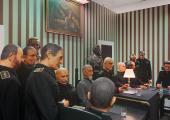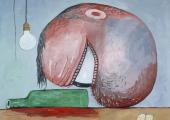Son of Saul

Dead man walking: Hungarian exploration of the closed universe of Auschwitz-Birkenau
In the world of the concentration camp, clothes or the lack of them sealed your fate.

In the world of the concentration camp, clothes or the lack of them sealed your fate.

If an authority figure ordered you to inflict pain on another person, to what extent would you comply? That is the subject of Experimenter, which focuses on Stanley Milgram's controversial obedience experiment. Unable to secure a theatrical run in the UK, writer-director Michael Almereyda’s urgent biographical drama, which had its premiere at Sundance last year, is now available on DVD and for digital download. The movie’s unsettling depiction of our capacity for cruelty makes it essential viewing.

Following his inclusion in this year’s Venice and Istanbul biennials, Italian artist Fabio Mauri has leapt into the limelight. He is from the same generation as Mario Merz; but whereas Merz and his Arte Povera colleagues have long since enjoyed an international reputation for work which features non-art materials in a raw state (hence the name "Poor Art"), Mauri has languished in relative obscurity – until now, that is.

What a woman. Does the news that Kate Winslet is to play the polymath Lee Miller in a Hollywood biopic mean a kind of sanctified apotheosis of Miller's quite extraordinary life? The story is so dramatic it transcends any fiction. Her path was controversial, imaginative, accomplished, and in many ways profoundly sad, an emotional roller-coaster. But the legacy is astonishing, as more and more of her achievement as a photographer is revealed.

Light. Light banishes the shadows where monsters lurk and where ghosts rattle their chains. “Give me some light, away!” cries the usurping king in Hamlet as his murderous deed is exposed by the trickery of art. What guilt plagues and seizes his conscience, and yet Claudius, conflicted, cannot pray. He must, therefore, remain a captive among the ghosts and the monsters where no light may fall.

Few cities have been so central to the European imagination as Berlin in the 20th century. At the centre of imperial power, then of Weimar, next the hub of Nazi Germany, then for some 50 years a symbol of a divided Cold War world. In Rose Lewenstein’s new play, Now This Is Not the End, the city is remembered with a touch of nostalgia by Eva, an old German lady living in London. But these memories are under threat: she is beginning to suffer from dementia so her vivid recollections are becoming cloudy – can anyone help her preserve her past?

“Enjoy the war, for the peace will be savage,” was apparently a macabre joke circulating in the German military towards the end of World War Two. Peter Molloy’s searing documentary, 1945: The Savage Peace, showed us just how prescient it would prove, charting the cruelties that would follow the end of conflict. Man’s inhumanity to man would continue long after the war itself had formally ended.

This is a great, neglected film of Nazi Germany. After being savaged by German critics for its “subjective” and “sentimental” perspective on the Third Reich at its 1980 Berlin Festival premiere, it was released with 30 minutes slashed. This is the restored director’s cut’s DVD debut.

Although the shadows of the Holocaust and German guilt hang over Christian Petzold’s sixth outing with his formidable muse Nina Hoss, Phoenix is more concerned with the essence of female identity. It contextualises in dreadful circumstances and iterates, as no other film has done in recent years, the politically incorrect but no less obvious and appalling notion that a woman’s face is her most valuable real estate, the thin, fragile wall that separates her from emotional destitution.

Agitprop is a term that seems to have dropped out of use. It has too many negative connotations; it smacks of political rant. Yet artistic director Neil McPherson, whose small and feisty Finborough Theatre at Earls Court receives no public funding whatsoever, has never pandered to delicate West London sensibilities, and I Wish to Die Singing: Voices from the Armenian Genocide, scripted by him, certainly doesn’t flinch from its task. This is, no less, to fill a gaping hole in the official history of the 20th century. Propaganda? You decide.